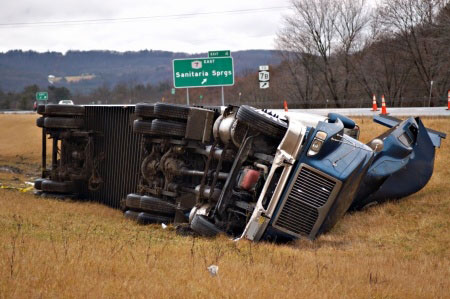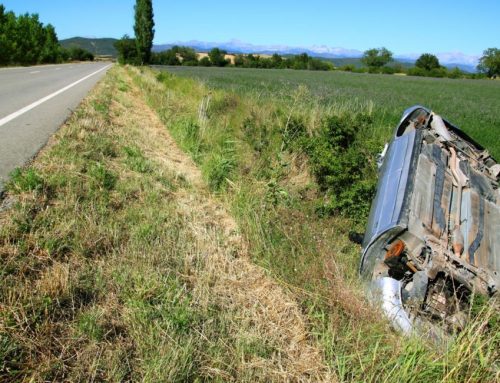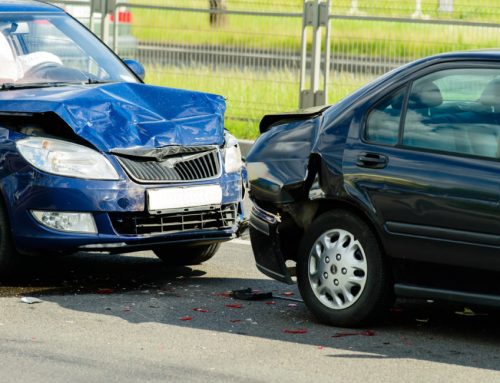Russell Guest and Richard Allen of Guest & Brady, personal injury attorneys in Greenville, South Carolina, speak about personal injury questions they are often asked after a client has been involved in a tractor trailer accident.
John Maher: Hi, I’m John Maher. Today I’m speaking with Russell Guest and Richard Allen of Guest & Brady in Greenville, South Carolina. Guest & Brady is a personal injury law firm. Today we’re going to be talking about frequently asked personal injury questions after a tractor trailer accident.
Russell and Richard, welcome.
Russell Guest: Thank you, John. This is Russell here.
Richard Allen: Hey, John. Good afternoon. Thanks for having us. This is Richard.
What Causes a Tractor Trailer Accident?
John: What are some common scenarios for tractor trailer accidents and what typically causes them?
Russell: John, this is Russell. I’ll start with that. The causes are not so unlike that of an auto accident. They can include many different types of causes. One of them would be fatigue or inattentiveness, maybe distracted driving because of being on a cell phone or because of the fatigue factor and just not paying attention to the roadway.
Or even intoxicated driving, whether because of alcohol or because of prescription drugs. There could be other factors, [such as] debris in the roadway or items in the roadway that cause cars or trucks to have to divert and move into other lanes. These are typical causes of an accident in a tractor trailer.
John: Certainly fatigue would be a big one because a lot of these tractor trailers are doing very long trips across many states, in some cases. I’d have to imagine that you’re driving on the highway and you get that constant looking at the road. It mesmerizes you and puts you to sleep in some cases.
I think that happens with regular automobile drivers. I’d have to imagine that that happens very often with tractor trailers, as well. Although, of course, tractor trailer drivers are good drivers who have been trained in that, so I’m sure that they have ways to try to avoid that type of thing, but it does happen.
Richard: One distinction between a tractor trailer driver and a regular automobile driver, [is that] there’s certainly state rules that both categories would have to follow. There are additional regulations that truck drivers must comply with as far as hours of service. In other words, how long they can be on the road driving for a specific period of time during the day. There are specific rules and regulations governing that.
When Should You Call an Attorney After a Tractor Trailer Accident?
John: If you’re in an accident with a tractor trailer, when do you need to call an attorney?
Russell: A tractor trailer accident obviously can be all degrees of seriousness, just like an automobile accident. We’ll get into some real distinctions between the tractor trailer accident and that of an automobile accident but, just like in an automobile accident, there can be degrees of seriousness.
We could be anywhere from a minor property damage type of accident to real serious, life threatening and life ending sort of accidents. We’ve handled those all here in our law firm.
When to call an actual attorney depends on the seriousness, obviously, of the accident. If we’re talking about a simple property damage accident, it might not necessarily be important enough to call an attorney. There can be reasons to do that if the insurance carriers or the trucking companies are not being cooperative in dealing with them. Obviously, whenever there’s injury involved you should always consult with an attorney in regards to that.
There’s so many safeguards that the trucking industry has built into their way of handling a particular claim that they are very responsive to these. This is their business, their livelihood. They are ready to respond at any time. They oftentimes will have attorneys on call that will respond to an accident scene, even in the middle of the night.
There’s an accident. The trucking company is immediately made aware of that from the driver themselves. They’ve called dispatch first. In a recent accident that we’re working on, they called their dispatch first before they even called 911 because they want the trucking company to be responsive quickly. That’s the way they’ve been trained.
That dispatch calls their legal representation, the defense attorney, wherever that is in the country, to respond. They’re out there. Here was a midnight crash. Their attorney is on the scene trying to evaluate the actual crash and advise the employee of the trucking company on how to respond to questions from the highway patrol and from other investigators that are at the scene.
I promise you that you’re not getting a fair shake when you’re dealing with a trucking company and their sophisticated methods of dealing with claims. They may be nice when they’re talking to you, but they’re working on ways that they can reduce the amount that they have to pay out in any claim.
John: So you do have to be aware, as a driver of an automobile, if you’re in an accident with a tractor trailer, you’re not just dealing with the driver of that trailer. You’re actually dealing with the trucking company and potentially the trucking company’s team of attorneys that’s on their side. That’s something that you need to be aware of.
Russell: Absolutely. It’s very critical to understand.
Richard: John, I’d like to jump in and add another important reason for contacting an attorney and getting an attorney involved. That’s preserving evidence.
We talked earlier about these federal rules, of regulation in the trucking industry. There are specific records retention policies that are set by those particular rules. For instance, we were discussing the hours of service and driver fatigue. The drivers are required to keep daily logs.
There are specific rules governing that practice as well as governing how long an employer is required to keep those records. Many other types of data, [like] onboard data such as equipment inspection and maintenance records, could all be very critical pieces of evidence to a case. It’s important to preserve those in order to help the case.
How Does an Attorney Approach a Tractor Trailer Accident Case?
John: As personal injury attorneys, given all of the information that you’ve given me up until now, does that mean that you approach tractor trailer accidents differently than other kinds of auto accidents?
Russell: Very much so, because there’s a lot of regulation in the industry for important reasons. We know that tractor trailers are out there on the roadway. We see them. We are right next to a particular interstate called Highway I‑85 and I‑26 as well. Any of us that drive those highways recognize that those trucks are just out there and surrounding you at all times on the roadway. They’re massive. They’re huge.
And they’re good – it’s important to have the ability to transport our goods around the country. In no way do we say that we shouldn’t have those, but we certainly understand the importance of regulating them and that those regulations are important for the safety of all individuals on the roadway.
We were talking about fatigue, for instance. There are a certain amount of hours that they can only drive within a certain timeframe. That’s important for the safety of all of us out there.
If a tractor trailer is responsible for the accident, it’s oftentimes because of fatigue. We have the Federal Motor Carrier Safety Administration that issues these regulations. These are important to understand.
An attorney who deals with these types of cases would have an understanding of those cases. You must, as an individual who’s injured, deal with an attorney who has had experience with tractor trailer cases before.
They’re dealt with totally different than an automobile accident claim for the reasons that Richard was saying earlier, in that we have spoliation issues. We have capturing accident reconstruction issues. We have witness issues that are very different when you have regulations that we need to be able to understand. The complexity of them rises dramatically in a tractor trailer accident.
John: Richard, any final thoughts on tractor trailer accidents?
Richard: Just briefly, to reiterate what I think Russ was trying to stress, is navigating the complexities that go along with a tractor trailer case are really different than a regular motor vehicle accident. Again, just preserving evidence and building the case and having an attorney that’s experienced in that, because oftentimes you’re going to need to get experts involved.
That’s another reason to have an experienced attorney. For instance, [as far as] witnesses and taking depositions [goes], there are different approaches [for] going about taking the depositions. Perhaps you’re going to have a corporation [or] the driver’s employer involved. There’s a specific rule and process for doing that.
It’s critical to act diligently in getting an experienced trucking lawyer involved.
John: Russell Guest and Richard Allen, thanks so very much, both of you, for speaking with me today.
Russell: Thank you, John.
Richard: Thanks, John.
John: For more information about Guest & Brady, visit their website at GuestBrady.com or call 800‑903‑8101 or 864‑233‑7200.






